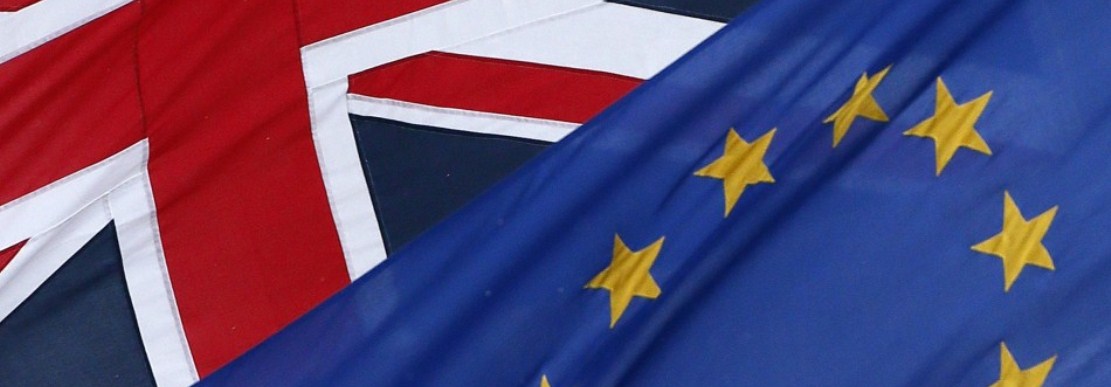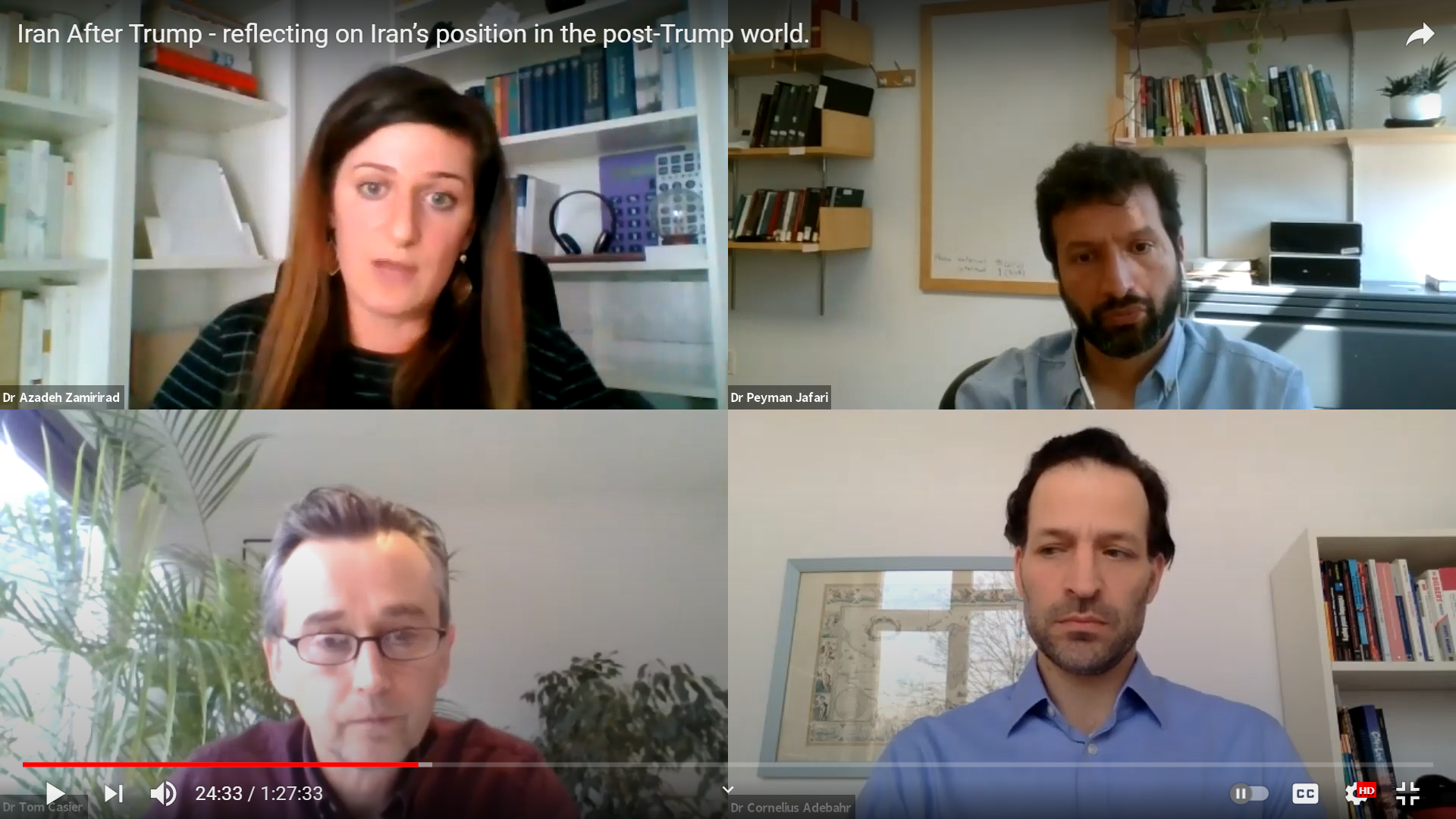By Harriet Finlayson, GEC intern, 3rd year Politics and IR student, University of Kent
Iran after Trump webinar, organised by the Global Europe Centre and Brussels School of International Studies, 10th March 2021
Panellists: Dr Azadeh Zamirirad (Stiftung Wissenschaft und Politik), Dr Cornelius Adebahr (Carnegie Europe), and Dr Peyman Jafari (Princeton University).
The recording of the webinar is available here.
The webinar, hosted by Global Europe Centre director Dr Tom Casier, focused on the relationship between Iran and the USA, the aftermath of Trump’s withdrawal from the Iran Nuclear Deal, the role of Europe in facilitating the reconstruction of trust between Iran and the USA and impact of domestic politics.
Dr Peyman Jafari, an associate research fellow at the Center for Iran and Persian Gulf Studies at Princeton University, opened the webinar by discussing the difficulty the USA may face in returning to the Iran Nuclear Deal. He highlighted the disappointment surrounding Biden’s elections and his failure to follow through with his campaign promise to swiftly return to the deal. Dr Jafari suggested that Biden’s failure until now to return to the deal may be due to the seductive nature of the USA’s sanctions on Iran. He also emphasised the time factor of the deal and how policymakers in the USA have assumed that time is on their side and Iran will eventually have to give in. However, he argued that this may not be correct, while Iran’s economic situation has deteriorated, it has not deteriorated to the degree that implosion is imminent.
Dr Azadeh Zamirirad, deputy head of the Middle East & Africa Division at the German Institute for International and Security Affairs (SWP), continued the debate by discussing the domestic situation in Iran. She made a key distinction between the sense of relief that Europe felt upon the election of Biden and Iran’s view that Trump was not an anomaly in American politics. There has not been a drastic change in perception of American leaders from Trump to Biden among Iranians. Furthermore, Dr Zamirirad highlighted that Iran is not simply content with just hearing about Biden’s good intentions, they feel that Biden must take a substantial step away from Trump’s policy towards Iran, which they are yet to do.
Dr Zamirirad highlighted three key issues; firstly trust. There has always been a lack of trust between the USA and Iran, the Iran Nuclear Deal was one of the first tests of this newfound trust and it was a negative experience for Iran. Thus, resulting in a bigger trust deficit now than before the deal. Building on this, the second key issue Dr Zamirirad highlighted was the USA’s lack of credibility, since they were the ones to withdraw from the JCPOA. The third key issue was the domestic dynamics in Iran. Dr Zamirirad talked about the overestimation of the Supreme Leaders willingness to join/uphold the nuclear agreement.
Dr Zamirirad summarised by saying that following Biden’s recent election it has not been a good start for USA and Iran relations, and the current approach by the USA should not be supported by European countries. If Biden is serious about improving relations with Iran then he should prove it by lifting sanctions. Dr Zamirirad stated that there is little chance of progress if Biden does not make the first move. Thus, highlighting the overarching theme of a trust deficit.
Dr Cornelius Adebahr, a fellow at Carnegie Europe focusing on foreign and security policy, delved into the role of European nations in the current situation. He stressed the role they have played in upholding the deal, despite the USA’s exit. However, after the election of Biden, Dr Adebahr suggested that the EU appears to be in a slump and are waiting for guidance from Washington, despite the Europeans being the guardians of the nuclear deal. He suggested that this can be attributed to the fact that the Europeans see their partnership with the USA as in need of repair, and Iran is simply less a priority to them. Resulting in this paradox of Europe having this responsibility to be a guardian of the deal but not making the restoration of the nuclear deal a priority.
The role the EU has taken was criticised by all panellists, with Dr Zamirirad suggesting that Europe should be the ones to take initiative to break the deadlock between Iran and the USA. Dr Adebahr highlighted how this would take a bold initiative from the EU. Dr Zamirirad continued her critique by stating that Europe should invest in European leadership and not rely on who is in the White House.
Dr Jafari developed this by suggesting that the previous leadership shown by Europe was a result of unity against Trump, but now he is gone we see the fragmentation come to the surface. He also critiqued the rosy picture painted of European countries, highlighting how the UK continues to export weapons to Saudi Arabia and France’s eagerness to achieve a bigger footprint in the Middle East, stressing how individual European countries come ahead of a united approach by the European Union. Dr Jafari also highlighted the role of China and Russia and how the USA views Iran through a geopolitical lens, focusing on Iran’s strategic alliances. This subsequently pushes Iran, China and Russia together with Iran looking more and more towards the East instead of the West, thus reducing the possibility of improving relations. The solution, Dr Jafari suggests, is to isolate the Iran Nuclear Deal from other policies.
Another key topic discussed in the Webinar was the issue of human rights. Dr Adebahr highlighted how human rights were set aside to make the signing of the nuclear deal possible. However, now some resist a return to the Iran Nuclear Deal and see it as rewarding the Iranian regime. He stated that including human rights in the conversation will make nuclear conversations more difficult.
Dr Jafari continued this by emphasising how international pressure on the human rights situation was counterproductive, often resulting in civil society suffering. Dr Zamirirad developed this argument by emphasising the unfortunate tendency to pit security issues and human rights issues against each other and to create a false dichotomy. She also emphasized how sanctions worsened human rights.
To summarise, it was a productive and interesting discussion, which encouraged a critical view on the West’s perception of Iran and their relationship with the USA while also emphasising the responsibility of the EU to uphold its role as the guardian of the deal.

